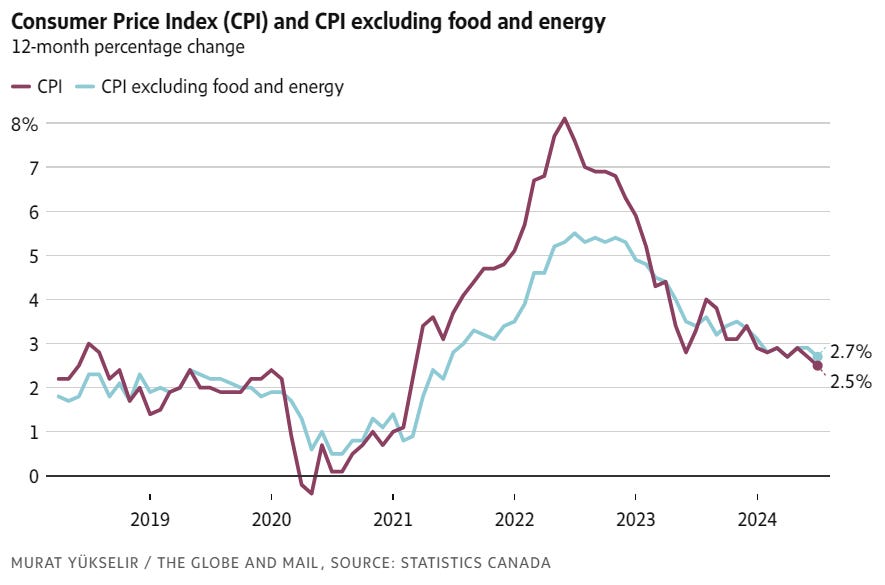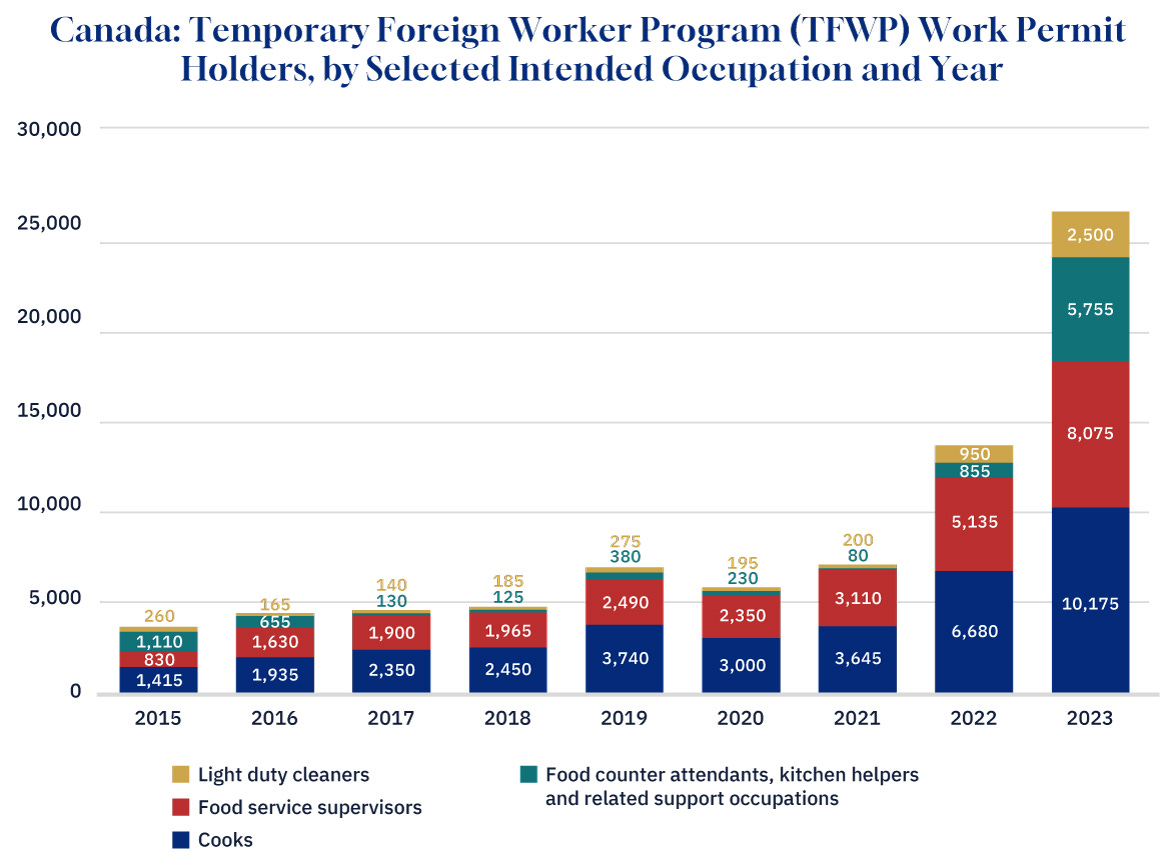Low-wage temporary foreign workers
Ottawa shifts to tightening restrictions
In April 2022, the federal government relaxed restrictions on temporary foreign workers, allowing up to 30% of employees to be temporary foreign workers in certain sectors, including for low-wage occupations like accommodation (hotels) and food services. At the time, I thought this was a bad idea.
The counterargument is that in the wake of Covid, there really were many fewer workers. In a December 2021 article, Matthew Yglesias described it like this: “I think it’s also that Covid has made work worse. If you’re Covid-cautious, non-remote jobs seem unsafe. If you’re not Covid-cautious, the mask rules and vaccine mandates in many workplaces are annoying.”
Yglesias points out that this was a bad thing, not a good thing: a negative supply shock results in lower output and higher inflation. He calls it “the ultimate leaky bucket.”
On Twitter, Alex Usher suggests that fighting inflation by bringing in more workers, reducing pressure to raise interest rates to painfully high levels, was a major policy objective during this period. The Toronto Star reported that the federal government fast-tracked applications starting in January 2022, presumably for the same reason.
Regardless, we're not in that situation any longer. The combination of higher interest rates and more workers was successful in cooling down the overheated economy. We have a severe housing shortage, and in the short term, reducing population growth is the biggest lever we have.
The numbers don’t seem huge, but it’s still affecting the availability of entry-level summer jobs for high school and post-secondary students.
New restrictions
On August 1, Marc Miller told Reuters that the federal government was planning further restrictions on immigration. Anna Mehler Paperny: More measures coming to reduce temporary residents, Canadian minister says.
Canada's government is preparing to unveil a suite of measures to clamp down on temporary immigration and has no plans to follow through right now on a broad program offering status to undocumented residents, the country's immigration minister told Reuters.
"The era of uncapped programs to come into this country is quickly coming to an end. This is a big shift. You can't just slam on the brakes and expect it to stop immediately," Marc Miller said in an interview with Reuters on Thursday.
On Monday, Trudeau announced that the April 2022 policy will be reversed. John Paul Tasker, CBC News: Trudeau announces reduction in temporary foreign workers, suggests more immigration changes to come.
Trudeau said employers in high unemployment areas — places where the unemployment rate is six per cent or higher — will not be able to hire low-wage TFWs, with limited exceptions for “food security sectors” like agriculture and food and fish processing as well as construction and health care where acute staffing shortages still exist.
In another reversal, the government said employers will no longer be allowed to hire more than 10 per cent of their total workforce through the TFW program.
Backgrounder with details.
I also thought these comments by Marc Miller were interesting:
Immigration Minister Marc Miller said “all options are on the table” when it comes to addressing immigration levels.
He acknowledged that some people have expressed concern to him about the current pace of population growth, which is among the highest in the developed world.
He said he's not a “dogmatic” minister who's unwilling to tweak permanent resident figures that the government has already set for the coming years.
“We need to look at where the country is going and make sure we adjust,” he said.
“I'm very open to making changes if the economics dictates it, if the social fabric dictates it,” he said. “That's smart politics and it's smart policy, and it's something that Canadians expect us to do.”
Mike Moffatt’s presentation to cabinet
Mike Moffatt made a presentation to cabinet on Tuesday. Via Twitter:
Since I've been here I've had 4 different journalists semi-seriously ask me "is there anything left you can possibly say to these guys you haven't said at past retreats or on your Twitter feed?" And the answer is, "yes... Sort of".
Three things to note from the outset.
I can't say what actually happens here or what is said. Cone of silence.
This is pro bono work.
If any gov't of any stripe wants me at one of these, I'd come.
I find the real value for me isn't so much the event itself, but all the side discussions. That is where new ideas are debated and discussed, and it’s not just me playing the greatest hits.
So while I can't and won't discuss what anyone said or did, I thought I'd share with you my remarks, which I call "54 minutes".
Via The Hub: My remarks to the federal cabinet on housing, immigration, and the temporary foreign worker program.
Moffatt discusses actions taken so far on the housing side, and recommendations for further action. His recommendations on the demand side:
On population growth, yesterday’s temporary foreign worker reforms are welcome news, but Canada must go much further. The TFW program, particularly the low-wage non-agricultural stream, suppresses wage growth, increases youth unemployment, creates the conditions for the exploitation of foreign workers, and reduces productivity, as it disincentivizes companies from investing in productivity-enhancing equipment. The low-wage stream should be entirely abolished, and the other streams should be substantially reformed, including creating a system of open permits.
Population growth targets, including both permanent and non-permanent residents, and housing growth targets, should all be incorporated into the annual release of the Immigration Levels Plan. The targets must be aligned, to ensure population growth does not outpace homebuilding, which will require substantial reductions in the permanent resident target over the next few years.
More from Moffatt:
Op-ed in The Hub: It’s time to seriously rethink Canada’s temporary foreign worker program.
Op-ed in the Toronto Star: Limits on the TFW program aren’t good enough. Part of it needs to go.
Twitter thread on alternatives to the low-wage TFW program. “With youth employment at an all-time low, how about a program that matches rural employers with underemployed teenagers and young adults from cities?” Or how about making the business 10% more productive?
Moffatt summarizes his recommendations in the Toronto Star op-ed:
Abolish the low-wage non-agricultural stream
Move to open permits
Reform the other streams to prevent wage suppression
Make some occupations ineligible, like admin assistants
Population growth and housing starts
Moffatt opened his presentation by highlighting the gap between population growth in 2022-2023 and housing starts:
In the next 54 minutes, Canada’s population will grow by 100 people.
In the next 54 minutes, Canada will start building 24 homes. Two-thirds of these will be apartments, and the majority of those will be one-bedroom or studio units.
Collectively, those 24 homes will house between 50-60 people. Let’s be generous and call it 65.
In the next 54 minutes, we will add 100 people, but only enough housing for 65 people, leaving the remainder, 35, effectively homeless. That’s 35 people, a group the size of the federal cabinet, with nowhere to call home. Every 54 minutes.
His explanation:
Based on 2022-23 growth rates:
31 babies will be born
29 people will die
40 people will immigrate to Canada as permanent residents
3 people will emigrate from Canada
60 people will move here as non-permanent residents
100 people every 54 minutes corresponds to total annual population growth of 977,000. Going forward, the federal government has already set a target for total annual population growth of 300,000: about 500,000 new permanent residents, minus -200,000 fewer temporary residents. That’s about 100 people every three hours, with 78 housing starts. But just setting the target isn’t enough - specific actions are needed.
More
An earlier post (primarily on amnesty) discussing the April 2022 TFW changes. Population growth targets. Province-wide caps on international students. Macroeconomic stabilization.
In March 2024 the federal government tightened the TFW program modestly, reducing the maximum number of TFW employees from 30% to 20%.
Last week, Randy Boissonault announced that in response to a request from the Quebec provincial government, the federal government would suspend processing of low-wage TFW applications for Montreal employers for six months. Business groups decry Quebec's restrictions on temporary foreign workers: Katelyn Thomas, Montreal Gazette.
Globe editorial: Immigration requires steady policy, not constant ad hoc change.
This morning’s news: Canada ends policy of allowing visitors to apply for work permits from within the country. Nicholas Keung, Toronto Star. This is another Covid-era policy, already set to expire in February 2025, but it’s now ended, effective immediately. “Some bad actors were using the policy to mislead foreign nationals into working in Canada without authorization.”




Still the right of framers, carpenters, plumbers, electricians and concrete-pourers to enter Canada should become some sort of sacred right.